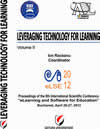TECHNOLOGY ENHANCED LEARNING (TEL):STUDENT TAILORED PRACTICES IN eLEARNING
TECHNOLOGY ENHANCED LEARNING (TEL):STUDENT TAILORED PRACTICES IN eLEARNING
Author(s): Mireia Usart, Margarida Romero, Luiza KRAFT, Ana-Maria Chisega-NegrilăSubject(s): Education
Published by: Carol I National Defence University Publishing House
Keywords: eLearning; bLearning; technology-enhanced learning; online education; student centeredness
Summary/Abstract: Today eLearning means more than learning content and courseware, and goes far beyond the Learning Management Systems (LMS), Personal Learning Environment (PLE), administration tools and authoring tools for building courses. Nowadays, the current challenges of eLearning are related to the lack of face-to-face interaction, the lack of sophistication in terms of Computer-Based Assessment and the challenge of developing engaging and stimulating online lessons. For students who shifted from a paper-based culture with handwriting, highlighting, post-it and gap-filling to a screen-based culture, with e-mails, blogging, gaming and webcams, streaming and googling are but a few of the solutions that would tailor eLearning for the 21st century skills and curriculum. Institutions have already challenged themselves unto meeting the new millennial students’ needs by providing courses which foster not only life and career skills, but also learning and innovation ones, in corporate training and formal education environments alike, focused on professional development and encompassed by clear standards, as well as assessment and curriculum issues. The present paper will showcase the actions taken with respect to all these aspects, both in Romania, by a team within “Carol I” National Defense University, and in Spain, by a team from ESADE Law and Business School. The first team will lay stress on the foreign language education-related organizational and pedagogical changes meant to support blended and eLearning strategies and management, whereas the second one will refer to management and law education; the main objective of the paper is to share the lessons learned, by highlighting both common aspects in terms of educational and methodological approach, and differences in terms of cultural response and attitudes of those benefiting from the eLearning type of education, irrespective of the way the latter is delivered, i.e., be it on-line or blended.
Journal: Conference proceedings of »eLearning and Software for Education« (eLSE)
- Issue Year: 8/2012
- Issue No: 02
- Page Range: 203-211
- Page Count: 9
- Language: English

